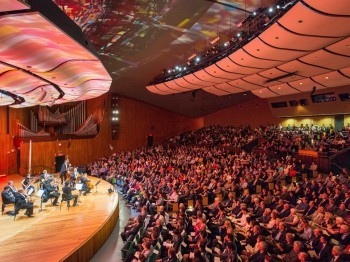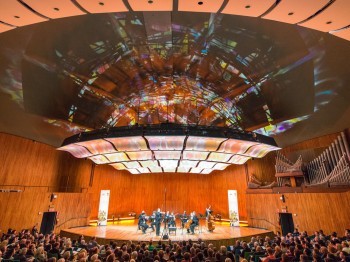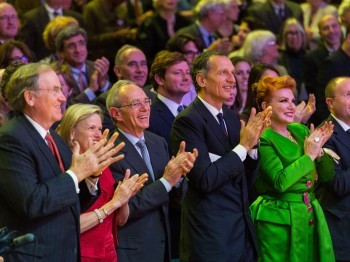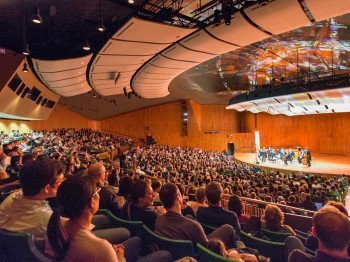La Scala Chamber Orchestra
eni and MIT present the musical medley, Fantasies from Verdi’s Operas performed by La Scala Chamber Orchestra.
About the Performance
Public Event
Fantasies from Verdi’s Operas on the occasion of the 200th anniversary of Giuseppe Verdi’s birth
October 7, 2013
Giovanni Avolio – Falstaff for violin, cello and orchestra
Luigi Mancinelli – Don Carlos for cello and orchestra
Luigi Mancinelli – Aida for cello and orchestra
Camillo Sivori – Il Trovatore for violin and orchestra
Antonio Bazzini – La Traviata for violin and orchestra
In the 1800s, the theatre’s musical pieces were performed for the public by means of transcriptions and adaptations. The author of these transcriptions, fantasies, or paraphrases is very often a well-known virtuoso who is using famous opera themes to show his talent as a composer and player. The form of Fantasies to which you will be listening in this concert includes the opera as a whole, through the selection, the assembling, and the re-elaborated version of some of Verdi’s most famous melodies. All of these are in a context that underlines the cantabile and virtuous qualities of the music itself. Camillo Sivori (Genoa, 1815 – Genoa, 1894), the only student who Paganini considered as his own, was one of the best violinists of his time and held concerts in Europe and America. Rossini and Verdi admired him and he had the privilege to play with Liszt, Mendelssohn, and Berlioz. He was also friends with two protagonists of the Italian musical world of the 1800s: Giovanni Bottesini and Alfredo Piatti. The fantasy for violin and piano Il trovatore op.20 was composed in 1862 (Verdi’s opera was represented for the first time at the Apollo Theatre in Rome in 1853). Antonio Bazzini, an international musician (Brescia, 1818- Milan, 1897), was an admired violinist and composer since his youth. He lived for a while in Germany, where he was very esteemed by Mendelssohn and Schumann, who dedicated an enthusiastic article to him. Afterwards he lived in Spain and Paris. When he decided to retire from concert activity in 1864, Bazzini concentrated on composing, becoming one of the main exponents of the instrumental rebirth in the second half of the 1800s. In 1873 Bazzini was nominated as professor of composition, and in 1882 as director of Milan’s Conservatory, where Mascagni, Catalani, and Puccini were his students. The fantasy for violin, orchestra, and piano La traviata op.50 was written in 1865 (the opera had been performed at the Fenice Theatre in Venice in 1853).
The cellist Luigi Mancinelli (Orvieto, 1848 – Rome, 1921) became a well-known director very quickly. Boito and Wagner admired him and he was probably the most important italian director of his generation. He travelled extensively in Europe and America, where he confirmed his talent in performing German music. Some of his theatre pieces spread internationally and he produced movie sound tracks as well in his later years. his production of the last years. For his instrument, the cello, Mancinelli wrote the Fantasy on Don Carlo (1870) and the one on the Aida (1873) (the Don Carlo had been performed for the first time at the Opera in Paris in 1867, and Aida at The Opera Theatre of Cairo in 1871).
Unlike the previous musicians, Giovanni Avolio (Naples,1849 – ?) is today a forgotten artist. We know very little about him and the date and place of his death are unknown. He composed the lirical comedy Rosetta the gardener, represented at the Rossini Theatre on Naples in April 1872. He was a teacher and friend of Giuseppe Martucci, who dedicated his Allegro appassionato op. 13 for piano (1874) to him. Avolio wrote many fantasies for operas for violin and cello accompanied by piano: except for the two on Othello (1888) and Falstaff (1893) (the two operas were represented at La Scala Theatre in Milan, respectively in 1887 and 1893). He composed other operas for violin, cello, and piano on Aida, Don Carlo, and the Forza del destino, the Gioconda of Ponchielli, and on Puccini’s Bohème. In a time when music could only be preformed live, these fantasies from Verdi’s operas represented a very important way to spread his music, which is testimony to the great popularity of his operas.
Eni is a major integrated energy company, committed to growth in the activities of finding, producing, transporting, transforming and marketing oil and gas. The company has global operations in 90 countries and employs about 78 thousand people.
Eni has been operating in the United States since 1962, when Agip USA Inc. was set up in order to promote the purchase of material of interest to Eni in the US. eni has been listed on the New York Stock Exchange since 2005. In 2007, Eni completed the purchase of Dominion Resources’ upstream operations in the Gulf of Mexico. The Company holds interests in 393 blocks in the U.S.: 281 in the Gulf of Mexico, 111 in the North Slope of Alaska and one in the Barnett Shale in Texas. In addition, Eni is operator of the Nikatchuq field in Alaska and holds a 30% stake in Oooguruk field, which has been in production since 2008. Eni’s daily production in the U.S. stood at 100,000 barrels of oil equivalent, of which 60% come from fields operated.
Culture is an important terrain for Eni’s initiatives, where it combines its nature as a large energy company with the social and cultural fabric of the countries in which it operates.Eni is able to take on board the expectations and needs of communities and it attributes the right importance to the promotion and dissemination of culture, convinced as it is that bringing people closer to art, music and literature is a key factor in the company’s growth and development. Eni supports numerous activities in the field of musical culture. Eni is a founder member of the Fondazione Teatro alla Scala of Milan. Eni is Corporate Ambassador of the Year of Italian Culture in the United States.
The mission of MIT is to advance knowledge and educate students in science, technology, and other areas of scholarship that will best serve the nation and the world in the 21st century.
The Institute is committed to generating, disseminating, and preserving knowledge, and to working with others to bring this knowledge to bear on the world’s great challenges. MIT is dedicated to providing its students with an education that combines rigorous academic study and the excitement of discovery with the support and intellectual stimulation of a diverse campus community. We seek to develop in each member of the MIT community the ability and passion to work wisely, creatively, and effectively for the betterment of humankind.
The arts at MIT connect creative minds across disciplines and encourage a lifetime of exploration and self-discovery. They are rooted in experimentation, risk-taking and imaginative problem-solving. The arts strengthen MIT’s commitment to the aesthetic, human, and social dimensions of research and innovation. Artistic knowledge and creation exemplify our motto — mens et manus, mind and hand. The arts are essential to MIT’s mission to build a better society and meet the challenges of the 21st century.
Website: Cameristi della Scala
Collaborators at MIT
Musicians
Francesco Manara – violin solo
Massimo Polidori – cello solo
Salvatore Quaranta – violin
Gianluca Scandola – violin
Joel Imperial – viola
Jakob Ludwig – cello
Alessandro Serra – doublebass
Flavio Alziati – flute
Alberto Negroni – oboe
Mauro Ferrando – clarinet
Laura Costa – bassoon
Claudio Martini – corno
Eni is the sponsoring partner of the La Scala Chamber Orchestra’s international tour.
About the Artists
“We are delighted to welcome the La Scala Chamber Orchestra to MIT to help celebrate the important research relationship between MIT and Eni. We feel incredibly fortunate to benefit from Eni’s relationship with La Scala and to share this esteemed ensemble’s performance with the MIT community.”
-MIT President L. Rafael Reif
The chamber orchestra of Cameristi della Scala was founded in 1982 and is formed by musicians from the Orchestra of Teatro alla Scala. Cameristi della Scala have performed concerts in the most prestigious theaters and concert halls in the world. In 2013 they performed in the magnificent setting of Hagia Irene for the Istanbul Festival, at the Auditorium National of Madrid, at the Teatro Coliseo in Buenos Aires and will open the Festival delle Nazioni in Città di Castello. Starting in October 2013, the celebrations for the Year of Italian Culture and the Bicentenario Verdiano brings the orchestra on tour in the United States, beginning with MIT Kresge Auditorium.
In addition to MIT Kresge Auditorium, La Scala Chamber Orchestra is performing in other prestigious concert venues like Carnegie Hall, the Library of Congress, at Brown University and in Miami.
“Fantasies from Verdi’s Operas” is a musical medley or “Fantasie” of Verdi’s operas composed by the composer’s friends and colleagues. These compositions, which are true celebrations of Verdi’s greatness, have been lying forgotten in libraries across the world since the 19th Century. The La Scala Chamber Orchestra found and transcribed these long lost “Fantasies” and is bringing them to the United States for the very first time.
Supporting cultural initiatives has always been a hallmark for Eni and in 2006 the company chose the motto “culture of Energy, energy of culture” to effectively describe its commitment to promoting artistic and cultural events in the countries in which it operates. Eni is partner of the La Scala Chamber Orchestra’s international tour, which has already included concerts in Moscow, Istanbul and Oxford and now kicks off their U.S. tour.
Learn more about La Scala.
La Scala Chamber Orchestera (Cameristi della Scala) was founded in 1982 and is formed by musicians from the Orchestra of Teatro alla Scala in Milan, Italy.




